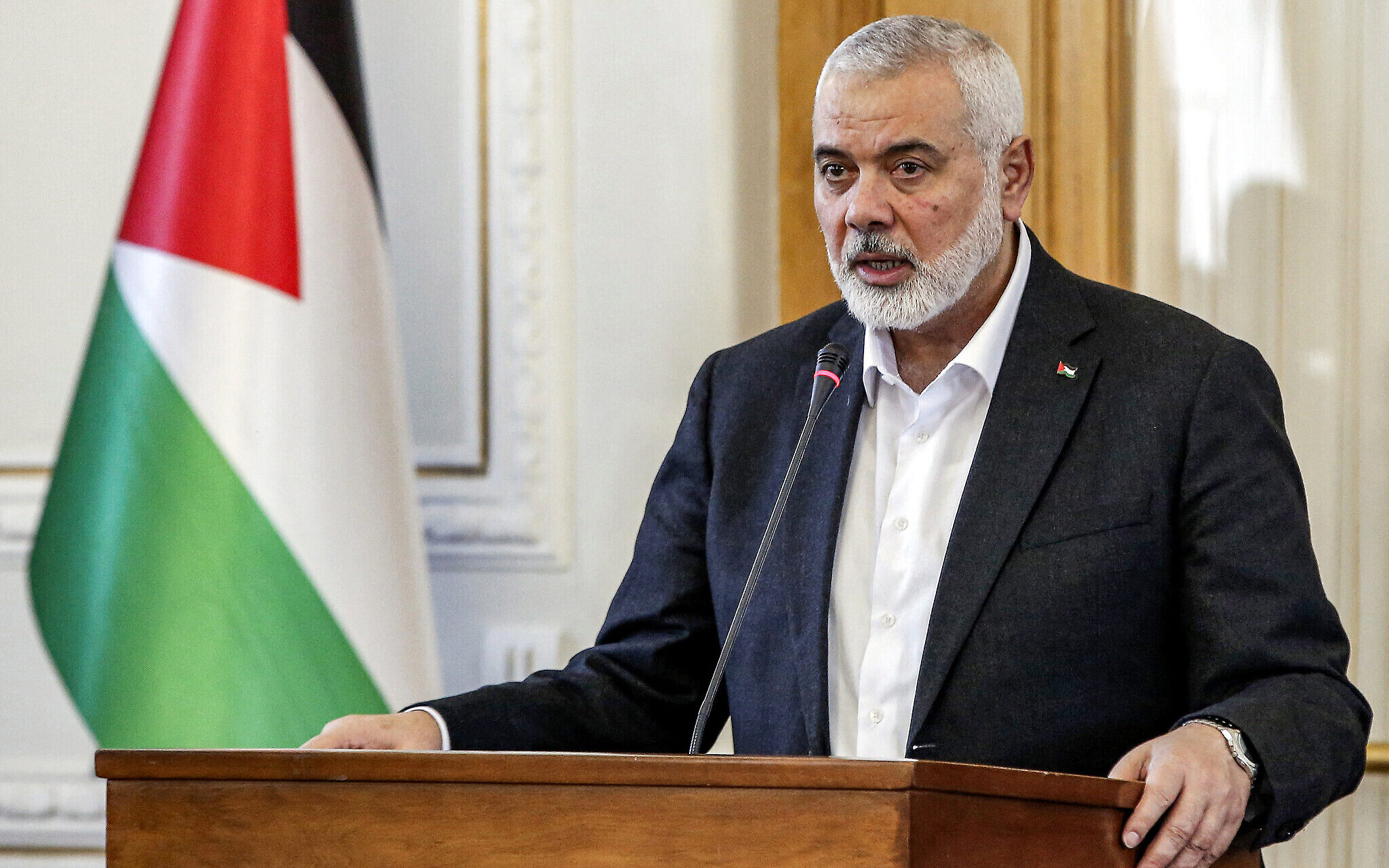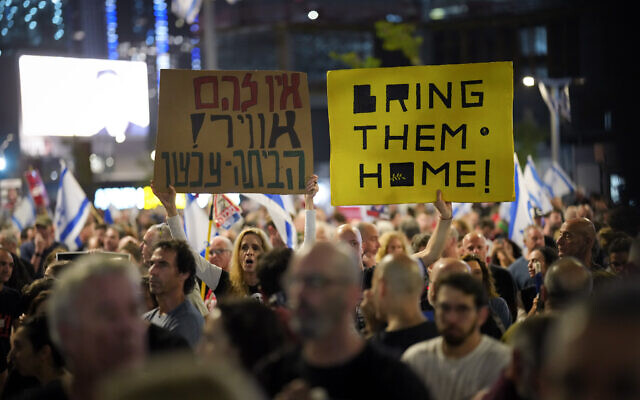



Hamas on Monday evening claimed to accept a deal to pause the fighting in the Gaza Strip and release hostages held since October 7, as Israeli officials cautioned against taking the terror group’s announcement at face value.
“After Hamas agreed to the mediators’ proposal for a ceasefire, the ball is now in the court of Israeli occupation, whether it will agree to the ceasefire agreement or obstruct it,” a senior Hamas official told AFP.
Immediately after the announcement, Israeli officials told Hebrew media that the terms Hamas claimed to have accepted did not match those that Israel had approved. They noted that the proposal was made unilaterally by Egypt and would not be taken seriously in Jerusalem until the details have been clarified.
Nevertheless, the Hamas announcement set off celebrations among Palestinians in Gaza.
Hours after the Hamas announcement, Israel’s cabinet decided unanimously to push ahead with the fledgling operation in Rafah “in order to apply military pressure on Hamas, with the goal of making progress on freeing the hostages and the other war aims,” said the Prime Minister’s Office in a statement.
Israel is also sending a working delegation to engage in talks in an attempt to find a deal that meets Israel’s demands, said the PMO. The statement stressed that Hamas’s offer is “far from Israel’s vital demands.
Meanwhile, the IDF announced that troops were striking and operating against Hamas sites “in a targeted manner” in eastern Rafah. The announcement came after Palestinian media reported a series of strikes in the area, where the IDF earlier called for civilians to evacuate.
Israel officials quoted by Channel 12 said the negotiating team could tell that “this is not the same proposal” for a deal that Israel and Egypt agreed upon 10 days ago, and that served as the basis for the indirect negotiations since then.
“All kinds of clauses” have been inserted, the TV report said.
These new clauses, among other issues, relate to the cardinal questions of if, how and when the war would end, and what kind of guarantees were being offered to that effect. The report noted that Hamas had been toughening its demands in recent days, and demanding that the war end during the first, 40-day phase of the deal, rather than in the second or third phases.
Israel, for its part, has repeatedly rejected ending the war as part of a hostage deal at all, instead insisting that it will resume fighting once the deal is implemented, in accordance with its twin war goals: returning the hostages and destroying Hamas’s military and governance capacities.
An Israeli official told Reuters that the Hamas announcement appeared to be a ruse designed to cast Israel as the intransigent side in the talks, following days of the US saying the ball was in Hamas’s court.
The official said that the proposal Hamas has accepted was a “softened” version of the Egyptian proposal, which includes “far-reaching” conclusions that Israel cannot accept.
Hamas deputy chief in Gaza Khalil Al-Hayya told Al Jazeera that the proposal that the terror group has agreed to is a three-phased agreement, and that each stage will be 42 days long.
He also said the second stage of the agreement stipulates a full IDF withdrawal from Gaza, though Israel has repeatedly said it will not accept a deal that conditions the release of hostages on ending the war, which erupted after Hamas’s October 7 massacre, when thousands of terrorists murdered some 1,200 people and seized 252 hostages, mostly civilians, many amid acts of brutality and sexual assault.
In response to the onslaught, Israel launched a wide-scale offensive aiming to eliminate the terror group’s military and governance capabilities in Gaza and free the hostages, over 100 of whom remain in captivity.
US State Department spokesperson Matthew Miller said that Washington had received Hamas’s response to the latest truce proposal and was reviewing it and discussing it with the Qatari and Egyptian mediators.
“I can confirm that Hamas has issued a response. We are reviewing that response now and discussing it with our partners in the region,” Miller said on Monday afternoon, confirming that a response was received in the last hour or 90 minutes and that discussions would take place in the coming hours.
CIA director Bill Burns is in the region “working on this in real time,” Miller added.
The announcement came directly after Netanyahu spoke with US President Joe Biden on the phone, with a considerable part of the call devoted to the efforts to reach a truce-for-hostages deal.
Leaders around the Arab world were quick to respond to the Iran-backed terror group’s announcement, with Palestinian Authority President Mahmoud Abbas calling on the international community to pressure Israel to commit to a ceasefire in Gaza, according to Palestinian official news agency WAFA.
Egyptian President Abdel-Fattah el-Sissi said he was closely following positive developments in the negotiations to reach a “comprehensive truce” in Gaza, and called on all parties to exert more effort to reach a deal.
Both Iranian Foreign Minister Hossein Amirabdollahian and Turkish President Recep Tayyip Erdogan said that they had spoken to Qatar-based Hamas leader Ismail Haniyeh on the phone on Monday regarding the deal.
The Iranian foreign minister said on social media platform X that Haniyeh had assured him, “We are sincere in our intentions,” while Erdogan posted, “During the call, in which I stated that I found it positive for Hamas to take such a decision with Turkey’s suggestion, we emphasized that Israel must take a step for a lasting ceasefire too.”
Meanwhile on the streets of Gaza, crowds of Palestinians could be seen cheering and firing guns in the air after Hamas claimed to have accepted the ceasefire proposal from mediators Egypt and Qatar.
People could be seen crying tears of happiness, chanting “Allahu Akbar” (“God is greatest”) and shooting in the air in celebration of the news, according to an AFP correspondent.
Netanyahu has for months vowed that Israeli troops would carry out an operation to root out the final Hamas strongholds in the southern Gaza city of Rafah regardless of a hostage release deal, with the IDF starting to issue evacuation orders to Palestinian civilians in the area on Monday.
The terror group, meanwhile, has rejected repeated Israeli truce offers during months of negotiations, with US officials repeatedly saying that the ball was in Hamas’s court when it came to accepting a deal.
US Secretary of State Antony Blinken last week called the latest Israeli-backed proposal “extraordinarily generous” and said it should be a “no-brainer” for Hamas to accept. The specifics of the offer were widely reported, but not officially published or confirmed.
Throughout the months of negotiations to secure a deal, media reports have repeatedly suggested potential breakthroughs, but talks have always ultimately broken down in part due to Hamas’s demand for a permanent ceasefire and Israel’s refusal to end the war without moving to eliminate the group’s remaining fighters in Rafah.
Times of Israel staff contributed to this report.




